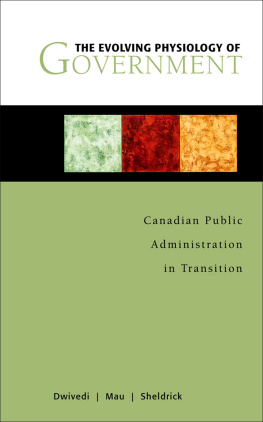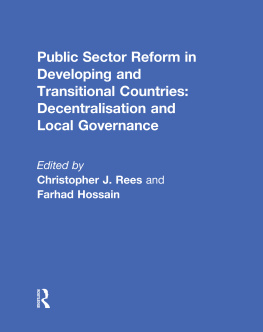COMPARING PUBLIC SECTOR REFORM IN BRITAIN AND GERMANY
Comparing Public Sector Reform in Britain and Germany
Key traditions and trends of modernisation
Edited by
HELLMUT WOLLMANN
Humboldt-Universitt zu Berlin
ECKHARD SCHRTER
Humboldt-Universitt zu Berlin
First published 2000 by Ashgate Publishing
Reissued 2019 by Routledge
2 Park Square, Milton Park, Abingdon, Oxon, OX14 4RN
52 Vanderbilt Avenue, New York, NY 10017
Routledge is an imprint of the Taylor & Francis Group, an informa business
Hellmut Wollmann and Eckhard Schrter 2000
All rights reserved. No part of this book may be reprinted or reproduced or utilised in any form or by any electronic, mechanical, or other means, now known or hereafter invented, including photocopying and recording, or in any information storage or retrieval system, without permission in writing from the publishers.
Notice:
Product or corporate names may be trademarks or registered trademarks, and are used only for identification and explanation without intent to infringe.
Publishers Note
The publisher has gone to great lengths to ensure the quality of this reprint but points out that some imperfections in the original copies may be apparent.
Disclaimer
The publisher has made every effort to trace copyright holders and welcomes correspondence from those they have been unable to contact.
A Library of Congress record exists under LC control number:
ISBN 13: 978-1-138-71757-2 (hbk)
ISBN 13: 978-1-315-19629-9 (ebk)
Contents
Hellmut Wollmann
Nevil Johnson
Klaus Knig
L. J. Sharpe
Gerhard Lehmbruch
Hellmut Wollmann
Frederick F. Ridley
Hans-Ulrich Derlien
Eckhard Schrter and Manfred Rber
Eckhard Schrter
John Clarke and Paul Hoggett
Dieter Grunow
Brian Munday
Rolf G. Heinze and Christoph Strnck
Michael Hill
Frank Bnker and Hellmut Wollmann
B. Guy Peters
Frank Bnker is Lecturer in Economics at the European University Viadrina Frankfurt (Oder).
John Clarke is Professor of Social Policy at the Open University.
Hans-Ulrich Derlien is Professor of Administrative Science at the University of Bamberg.
Dieter Grunow is Professor of Government and Public Administration at the Gerhard-Mercator University Duisburg.
Rolf G. Heinze is Professor of Sociology at the Ruhr-University Bochum.
Michael Hill is Visiting Professor of Social Policy and Politics at Goldsmiths College, University of London.
Paul Hoggett is Professor of Government at the University of the West of England Bristol.
Nevil Johnson is an Emeritus Fellow of Nuffield College Oxford.
Klaus Knig is Professor of Public Law and Public Administration at the Postgraduate School of Administrative Sciences Speyer.
Gerhard Lehmbruch is Emeritus Professor of Government at the University of Konstanz.
Brian Munday is Director of the European Institute of Social Services (EISS) at the University of Kent at Canterbury (UKC).
B. Guy Peters is Maurice Falk Professor of Government at the University of Pittsburgh.
Frederick F. Ridley is an Emeritus Professor of Government at the University of Liverpool.
Manfred Rber is Professor of Public Management at the Fachhochschule fur Technik und Wirtschaft Berlin.
Eckhard Schrter is Assistant Professor of Government and Public Administration at the Humboldt-University Berlin.
L. J. Sharpe is an Emeritus Fellow of Nuffield College Oxford.
Christoph Strnck is Assistant Professor of Political Science at the University of Dsseldorf.
Hellmut Wollmann is Professor of Government and Public Administration at the Humboldt-University Berlin.
During the last two decades public sector reform has ranked high on the political agenda throughout Western Europe. In particular, there has been an explosion of reform initiatives associated with the New Public Management (NPM) movement. The British and German cases are no exception to this rule, but whereas the United Kingdom has been swept by a tidal wave of administrative change, Germany has so far only seen comparatively faint ripples. Many reports on public sector modernisation portray NPM-driven changes as a secular trend, yet there is also good reason to suggest that deeply rooted political and institutional structures, as well as of entrenched administrative cultures have had a crucial impact on the numerous reform programmes for public bureaucracies. In this context, country comparisons often run the risk of only looking at the face value of ongoing public sector changes without reflecting on how much the current reform discourses are embedded within specific institutional and cultural traditions. Furthermore, progress of comparative research in this field may be severely inhibited by an unfortunate split amongst various scientific communities, thus keeping generalists with their broad dimension of expertise apart from specialists who focus on developments in particular policy areas. Similarly, this research field has become an increasingly contested area for public management experts on one side and political scientists on the other.
Starting from the assumption that a clear understanding of each countrys key political and administrative traditions is necessary in order to overcome the problem of possible ecological fallacies and to promote mutual learning processes, this volume applies a pronouncedly political science approach to the study of public sector developments. At the same time, it brings together political scientists, public management experts and policy specialists. In doing so, this work pursues a twofold objective. First, it seeks to examine in the light of the New Public Management discussion those key institutional and cultural factors which are most likely to shape current public sector reform policies in Germany and the United Kingdom. Second, the volume sets out to link the results of these discussions to actual reform trends in the fields of social policies and social administration in order to generate applicable and problem-oriented results.
In view of the characteristic traits of the British and German state traditions, we suggest that (at least) four broadly defined factors can be identified. The first category is concerned with the underlying notion of the state and state-society relations in historical perspective. Whereas Klaus Knig highlights the pervasive German tradition of the administrative state, Nevil Johnson contrasts this continental concept of the state with the Anglo-Saxon civil society tradition. Second, the structural features of the government systems and the peculiar type of intergovernmental relations are most likely to have a lasting impact on the substance and course of reform processes. As a consequence, the influences of the unitary and federal state models, i.e. the way in which administrative functions and political power are distributed among the various tiers of government, deserves our closer attention. While Hellmut Wollmanns













